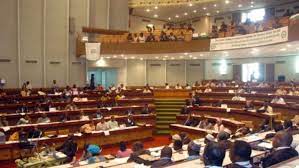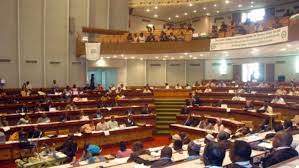Here in this post, we discussed the senate house of Cameroon, in addition we explain the electoral system, president and members of the senate.
HISTORY
Cameroon has a bicameral parliament composed of the Senate and the National Assemble. The Senate was created in 1996 following an amendment to the constitution that created the upper chamber. The senate effectively became operation in 2013 following the signing of Presidential decree 2013/056 on 27 February 2013 that convene the Electoral College and call elections for the Senate. According to the constitutions, the Senate has 100 seats, representing ten senators per region. Of the number 70 are elected while 30 appointed by the President of the Republic.
Read: NATIONAL ASSEMBLY OF CAMEROON
The first senatorial elections in Cameroon were organized on Sunday, 14th April 2013. The Electoral College composed of 10,636 Municipal Councilors from the 360 municipal councils in the country voted in their divisional headquarters. At the end of the poll, the Cameroon People Democratic Movement, CPDM party had the majority of senator elected after winning in eight out of the ten regions. The Social Democratic Front, SDF opposition party grabbed the majority votes in the Adamawa and West regions were the CPDM list was disqualified and not allowed to run. Amongst the 30 senators appointed the President of the Republic include some members of other opposition parties.
During the first session as of right of the senate chaired by the Eldest member Senator Victor Mukete, the bureau of the senate was elected and Marcel Niat Njifenji was made the pioneer president of the senate in Cameroon. As per the constitution, the President of the Senate is the constitutionally designated successor to the President of the Republic in case of a vacancy in the latter office.

ELECTORAL SYSTEM
The mandate of the first legislated of the Senate expired in 2018 and fresh elections were organized on 25th March 2018. At the end of the elections, the CPDM won in nine out of the ten regions while the SDF won in the North West region. The Chairmen’s conference composed of Presidents of Parliamentary Groups, Chairmen of Committees and members of the Bureau of the Senate and a member of Government draw the agenda of the senate. Each year, the Senate holds three ordinary sessions, each lasting not more than 30 days. At the opening of its first ordinary session, the Senate elects its President and Bureau members. The Senate meets in extraordinary session for not more than 15 days on a specific agenda and at the request of the President of the Republic or of one-third of its members.
The Senate has 100 seats, of which 70 are elected and 30 appointed by the President, with each region having 10 Senators. The elected seats are elected by the 10,636 members of the 360 municipal councils. Elections to the Senate were held for the first time on 14 April 2013. Marcel Niat Njifenji was elected as President of the Senate on 12 June 2013. The President of the Senate is the constitutionally designated successor to the President of the Republic in case of a vacancy in the latter office.
Presidents of the Senate
| Name | Entered office | Left office |
| Marcel Niat Njifenji | 12 June 2013 | Incumbent |
CURRENT MEMBERS OF THE SENATE
The Senate consists of 70 members directly elected by their regions and 30 nominated by the president of Cameroon
| Region | Elected members | Appointed members |
| Adamawa | Aboubakar Siroma Maikano Abdoulahi Haman Paul Maande Paul Nguiebe Joël Haoua Madeleine Ahmadou Tidjiani |
Baba Hamadou Moussa Sabo Mohaman Gabdo |
| Centre | Naah Ondoa Sylvestre Mama Jean Marie Anong Adibimé Pascal Bell Luc René Nicole Okala Essomba Tsoungui Elie Nnemdé Emmanuel |
Nkodo Laurent Ondoua Pius Pongmoni Jean Marie |
| East | Salé Charles Tokpanou Isabelle Ouli Ndongo Monique Ndanga Ndinga Badel Amama Amama Benjamin Moampea Marie Calire Mboundjo Jean |
Matta Joseph Roland Zé Nguelé René Aboui Marlyse |
| Far North | Abba Boukar Alioum Alhadji Hamadou Julienne Djakaou Mahamat Abdoulkarim Mme Zakiatou Abdoulaye Wouyack Marava Amrakaye Martin |
Mahamat Bahar Marouf Baskouda Jean Baptiste Dakolé Daïssala |
| Littoral | Geneviève Tjoues Tobbo Eyoum Thomas Din Bell Armande Mbassa Ndine Roger Victor Kingué Simon Ebongue Jean Jules Kemayou Claude |
Madiba Songue Etame Massoma Siegfried Ngayap Pierre Flambeau |
| North | Youssoufa Daoua Namio Pierre Mme Asta Yvonne Ahmadou Alim Amidou Maurice Mme Adamou Bebnone Payounni |
Aboubakary Abdoulaye Hayatou Aicha Pierrette Hamadou Abbo |
| Northwest | Achidi Achu Simon Wallang David Akwo Dinga Ignatius Mme Enoh Lafon Wanlo John Awanga Zacharie Jikong Stephen Yerima |
Fon Doh Gayonga III Nkwain Francis Fon Teiche Nje II |
| South | Medjo Delphine Zang Oyono Obam Assam Mba Mba Grégoire Eloumba Medjo Thérèse Nnanga Ndoume Mbita Mvaebeme Raymond |
Ngalli Ngoa Pierre Henri Menye Ondo François Xavier Bisseck Paulette |
| Southwest | Tabe Tando Ndiep Nso Ankie Affiong Rebecca Amah Njifua Lucas Fontem Matute Daniel Mme Ntube Agnès Ndode Otte Andrew Moffa Mbella Moki Charles |
Mafany Musonge Peter Fun Mukete Essimi Ngo Victor Chief Anja Simon Onjwo |
| West | Tsomelou Jean Tantse Tagne Bernard Tatchouang Paul Metiedje Nguifo Tchetagne Delphine Sonkin Etienne Tchomnou Raoul M. Nono |
Sultan Ibrahim Mbombo Njoya Honoré Djomo Kamga Marcel Niat Njifenji |


